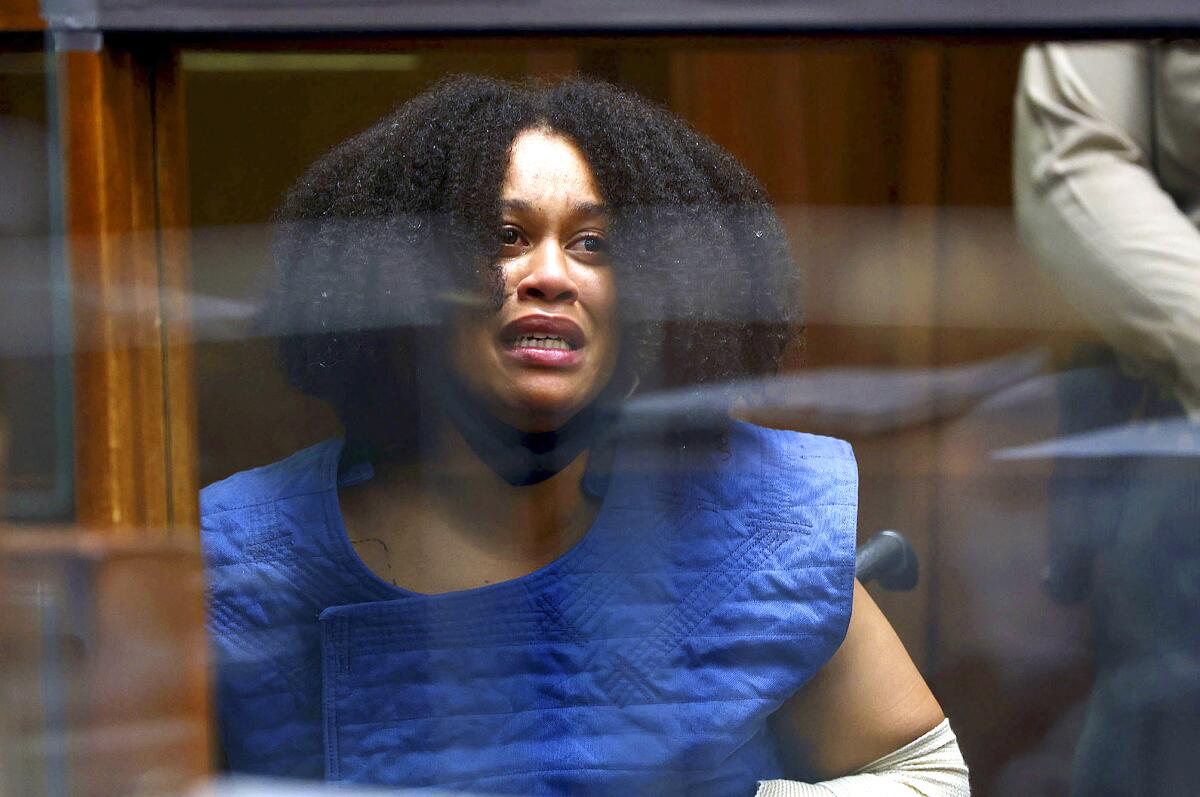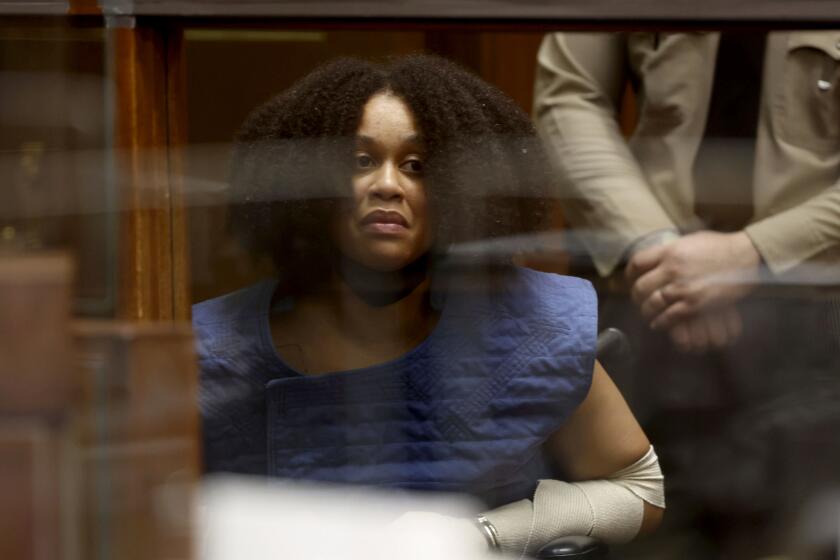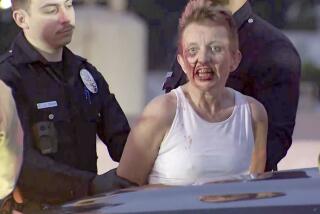‘Why do I feel like death is near?’: Mental state of suspect in fiery, deadly L.A. crash probed in court

Four days before a woman barreled into a busy Windsor Hills intersection at more than 100 mph, causing a deadly, fiery crash, prosecutors say, she searched online using her phone: “Why do I feel like death is near?”
That same day, they say, she also searched, “Can you see your dea[th] coming?”
Those internet searches were part of the evidence presented by prosecutors Friday against Nicole Linton, a traveling nurse charged in the deaths of five people and a fetus after crashing through the intersection of La Brea and Slauson avenues on Aug. 4, 2022.
Linton’s mental state, both before and during the crash, plays a central role in her legal proceedings. After a multiday preliminary hearing that began last week, a judge is set to decide whether there is enough evidence of a crime to take the case to trial. The preliminary hearing is set to continue this week.
Friends and colleagues are struggling to come to grips with how the woman they knew as a consummate professional and kind caregiver could be involved in such a horrific chain of events.
Linton’s family has said she struggled with bipolar disorder since 2018, and a psychiatrist testified Thursday that Linton had twice been hospitalized on account of mental issues prior to the crash.
However, Caleb Mason — Linton’s defense attorney — argued in court that she might have blacked out moments before the crash, possibly due to a seizure.
Linton’s defense attorneys have also raised questions about when she was taken into police custody, and whether statements she made after the crash should be admissible if she had not yet been advised of her Miranda rights.
On Monday, Mason also told the court the defense would be filing a motion to suppress data obtained from Linton’s cellphone, including online searches from her phone. Mason argues law enforcement inappropriately obtained the password from Linton after she had requested an attorney.
Prosecutors allege that Linton sped down La Brea Avenue toward the busy intersection of Slauson Avenue just after 1:30 p.m. on the day of the crash.
A new filing obtained by The Times details Nicole Linton’s history of bipolar disorder before the deadly crash and a doctor’s reactions to her mental state at the time of the collision.
California Highway Patrol investigator Jeffrey Crain testified that Linton’s Mercedes-Benz reached the intersection at a speed of 131 mph, striking multiple vehicles and sparking a fire that was caught on surveillance video.
Killed in the collision were Nathesia Lewis, 42; Lynette Noble, 38; 23-year-old Asherey Ryan, who was 8½ months pregnant at the time; Ryan’s 11-month-old son Alonzo Quintero; and her boyfriend, 23-year-old Reynold Lester.
Linton faces six counts of murder and five counts of gross vehicular manslaughter in connection with the collision.
Prosecutors on Friday showed images of the deadly crash, breaking the aftermath down frame by frame. As the images were projected onto a screen, relatives of the victims began to cry in the courtroom.
Linton lowered her head to look away from the images, and wiped her face with tissues.
An EMT, a doctor and a psychiatrist who treated Linton after the crash testified Thursday that the 39-year-old appeared confused, was unable to answer simple questions and repeatedly said she could not remember the moments leading up to the crash.
Nicole Linton’s family says she has struggled with bipolar disorder since 2018. Few but her closest confidants knew about her diagnosis.
EMT Isabel Schrama said she tended to Linton, who was sitting on the curb and bleeding from her face and arm immediately after the crash.
Linton did not answer when asked repeatedly for her name or birth date and became agitated, Schrama said, when she heard a paramedic confirm that there had been multiple deaths in the crash.
“She asked, ‘Did I kill people? Did I hurt people?’ And then she started to, I would say, freak out,” Schrama said.
In the downtown Los Angeles courtroom, prosecutors presented text messages, emails, online searches and documents found on Linton’s computer going back years. In past years she had researched suicide methods as well as suicide rates for nurses.
Suicide prevention and crisis counseling resources
If you or someone you know is struggling with suicidal thoughts, seek help from a professional and call 9-8-8. The United States’ first nationwide three-digit mental health crisis hotline 988 will connect callers with trained mental health counselors. Text “HOME” to 741741 in the U.S. and Canada to reach the Crisis Text Line.
One document — created in April 2020 and found on her laptop — was titled “Bitter F—ing Nurse” and referenced suicide, L.A. County Deputy Dist. Atty. Brittany Vannoy told the court.
Prosecutors said several other worrisome searches were found on Linton’s computer in the weeks leading up to the crash, including on June 18, 2022: “Why do I cry so easily lately?”
On May 8, 2022, prosecutors say, Linton searched, “Can’t eat or sleep due to anxiety” and, “When someone says they don’t want to die hours before they pass away.”
On Monday, Dr. William Cope, who tended to Linton after she was admitted to Ronald Reagan UCLA Medical Center after the crash, testified for prosecutors that Linton’s loss of memory appeared to have been caused by the crash, or was “psychiatric in nature.”
Mason asked the doctor whether Linton was specifically tested to see if she’d possibly suffered a seizure.
Cope testified that based on his notes, medical tests taken on Linton at the hospital shortly after the crash showed no signs she had suffered one.
According to Dr. Kristen Lee, a psychiatrist at Ronald Reagan UCLA Medical Center, Linton had been prescribed lithium and lorazepam after being diagnosed with bipolar disorder but admitted she had not taken medication for years.
Nicole Linton had her foot on the gas of her Mercedes-Benz for at least five seconds and ‘was conscious and deliberate,’ L.A. County prosecutors say.
Mason, Linton’s attorney, questioned whether medical tests taken at the hospital after the crash could have detected evidence of seizures, and if the medication she received, including fentanyl, could have affected her mental state.
Dr. Michael Levine, who attended to Linton after the crash, said that he didn’t believe the medication would affect her mental state and that the tests at the time did not show evidence of seizures.
At a hospital the day after the crash, Linton said that she did not remember how the crash occurred but that she had left a work potluck and was upset at her co-workers, Lee testified.
“She mentioned that she didn’t like [her co-workers] very much and they weren’t very nice to her, either,” Lee said.
Linton said she recalled leaving the potluck and calling her sister during the drive but did not remember the crash itself, Lee testified.
Lee said Linton told her the day of the crash: “The cop just told me that I killed all those people.”
Lee added, “She said that it was a nightmare, and she just wanted to wake up.”
More to Read
Sign up for Essential California
The most important California stories and recommendations in your inbox every morning.
You may occasionally receive promotional content from the Los Angeles Times.














